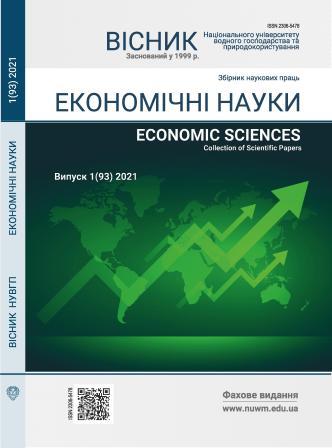INTEGRATED ENTERPRISE REPORTING AS A KEY SOURCE OF INFORMATION FOR STAKEHOLDERS
DOI:
https://doi.org/10.31713/ve1202114Keywords:
integrated reporting, information, stakeholders, construction, accounting, construction company, main activity, financial results.Abstract
The essence of integrated reporting is investigated and the stages ofits evolution are highlighted. The characteristics of each of the three stages of emergence and development of integrated reporting are given. The advantages of compiling and submitting integrated reporting from the standpoint of business entities and society are identified. It is established that from the standpoint of society the main advantages of the formation of integrated reporting is to increase information about the activities of enterprises and the creation of social capital. Among the shortcomings are legal risks. The main differences between financial and integrated reporting are considered according to such criteria as: object of study; structure; time orientation; disclosure of information; possibility of adaptation; approach.The recommended directions in the context of which the managementreport should be made are highlighted, in particular, such as: organizational structure and description of the enterprise activity; performance results; liquidity and liabilities; environmental aspects; social aspects and personnel policy; risks; research and innovation; financial investments; development prospects; corporative management.The composition of integrated reporting proposed for use by domesticscientists is outlined. It is determined that the majority of authors support positions in the part of the information provided in the International Standard on Integrated Reporting. It was found that the key aspect is the reflection in the integrated reporting of information illustrating the state and prospects of development of objects.Quantitative formation of integrated reporting by enterprises in thecontext of individual countries is considered. It is determined that the largest number of integrated reports from the studied sample of enterprises are USA enterprises, the smallest – Ukrainian businesses. The study of the process of formation of integrated reporting by enterprises of different countries of the world gives grounds for conclusions that integrated reporting is formed by: large enterprises (57,38%); medium enterprises (23,38%); small enterprises (19,24%). The results of the study of integrated reporting of the 44 largest construction companies in Australia are analyzed. In terms of financial results, revenues and expenses, construction companies in the integrated reporting are invited to provide information (in dynamics) on revenues, expenses and financial results by activities, types of buildings, structures, work performed and services provided, actors, nature of construction, as well as to cover the order of profit distribution.References
Дерій В. А., Дерій М. В. Облікові та аналітичні компоненти нефінансової звітності та їх роль в економічній системі. Зб. наук. праць Вінницького національного аграрного університету. Сер. Економічні науки. 2014. Вип. 2(88). С. 95–103.
Сапрыкина М. КСО-практика: 12 шагов при подготовке нефинасового отчета. URL: http://delo.ua/business/kso-praktika-12-shagov-pripodgotovke-nefinasovogootcheta-185313/?supdated_new= 1407152162. https://zakon.rada.gov.ua/laws/show/1087-15. (дата звернення: 18.03.2021).
Слюсарева Л. В. Використання нефінансової звітності як запорука застосування соціально-етичного маркетингу підприємствами України. Вісник Сумського національного аграрного університету. Сер. Економіка і менеджмент. 2012. Вип. 3. С. 90–99.
Гриценко О. І. Тенденції та проблеми формування інтегрованої звітності суб’єктами господарювання. Молодий вчений. 2014. № 2 (05). С. 31–34.
Король С. Нефінансова звітність підприємства. Вісник КНТЕУ. 2011. № 6. С. 102–113.
Блакита А. В., Поляк Р. С. Нефінансова звітність як інструмент оцінювання соціальної відповідальності бізнесу. Науковий вісник Херсонського державного університету. Сер. Економічні науки. 2015. Вип. 15. Ч. 4. С. 126–129.
Безверхий К. Економічна сутність поняття «нефінансова звітність». Науковий вісник Національної академії статистики, обліку та аудиту. 2017. № 1–2. С. 23–34.
Directive 2014/95/EU of the European Parliament and of the Council of 22 October 2014 amending Directive 2013/34/EU as regards disclosure of non-financial and diversity information by certain large undertakings and groups. URL: http:// eur-lex.europa.eu/legalcontent/EN/TXT/HTML/?uri=OJ:L:2014:330:FULL&from=EN#L_2014330 EN.01000101.doc. (accessed: 18.03.2021).
Regulation (EU) No 537/2014 of the European Parliament and of the Council of 16 April 2014 on specific бrequirements regarding statutory audit of public-interest entities and repealing Commission Decision 2005/909/EC. URL: http://eurlex.europa.eu/legalcontent/EN/TXT/PDF/uri=CELEX:32014R0537=EN (accessed: 18.03.2021).
Integrated reporting. EY. URL: https://www.ey.com/Publication/vwLUAssets/EY-Integrated-reporting/%24FILE/EYIntegrated-reporting.pdf (accessed: 18.03.2021).
Гуцаленко Л. В. Інтегрована звітність – інструмент оцінки якості управління бізнесом. Розвиток інтегрованої звітності підприємств : тези виступів Міжнар. наук. конф. Житомир : Житомирська політехніка, 2019. С. 42–43.
Гриценко О. І. Тенденції та проблеми формування інтегрованої звітності суб’єктами господарювання. Молодий вчений. 2014. № 2 (05). С. 31–34.
Кундря-Висоцька О. П., Шурпенкова Р. К. Інтегрована звітність як новий тренд презентації підприємства у суспільстві. Розвиток інтегрованої звітності підприємств : тези виступів Міжнар. наук. конф. Житомир : Житомирська політехніка, 2019. С. 99–100.
Легенчук С. Ф. Концепція інтегрованої звітності як засіб підвищення якості інформування про капітал підприємства. Сучасний стан, актуальні проблеми та перспективи розвитку обліку, контролю та аналізу : матер. Міжнар. наук.-практ. конф. до 20-річчя кафедри обліку і аудиту ІФНТУНГ. ІваноФранківськ : Вид-во ІФНТУНГ, 2015. С. 87–90.
Мазіна О. І. Людський капітал в інтегрованій звітності. Розвиток інтегрованої звітності підприємств : тези виступів Міжнар. наук. конф. Житомир : Житомирська політехніка, 2019. С. 261–262.
Озеран А. В., Коршикова Р. С. Звітність про сталий розвиток: складнощі формату. Розвиток інтегрованої звітності підприємств : тези виступів Міжнар. наук. конф. Житомир : Житомирська політехніка, 2019. С. 242–243.
Осадча О. О. Інтегрована звітність як елемент системи екологічно орієнтованого управління. Розвиток інтегрованої звітності підприємств : тези виступів Міжнар. наук. конф. Житомир : Житомирська політехніка, 2019. С. 137–138.
Садовська І. Б., Нагірська К. Є. Інструменти професійного судження бухгалтера для формування інтегрованої звітності. Розвиток інтегрованої звітності підприємств : тези виступів Міжнар. наук. конф. Житомир : Житомирська політехніка, 2019. С. 273–274.

